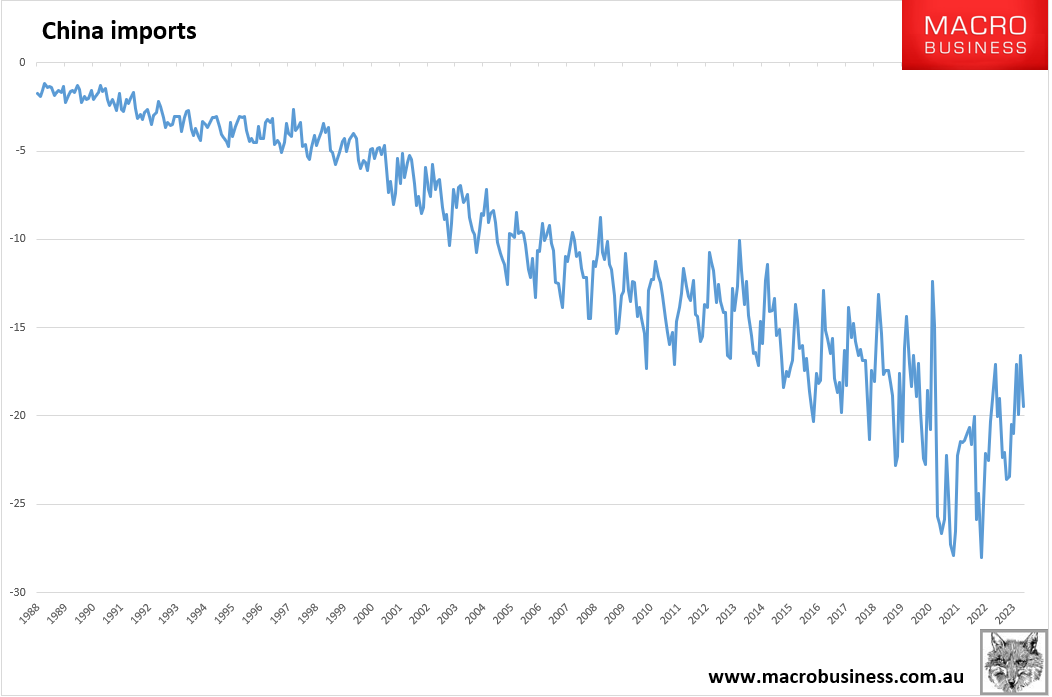I have noted the spectacular pace of US re-industrialisation. Cheap energy, cheap training, tax incentives, trade tariffs on China and technological leadership via innovation. Brilliant stuff driving a tearaway boom in everything from cars to chips:

We can add Germany to the China derisking push:
Germany said there is an urgent need for companies to de-risk from China, while “not pursuing a decoupling” of economies.
“For Germany, China remains a partner, a competitor, a systemic rival. But the aspect of systemic rivalry has become increasingly prominent in recent years,” Germany’s foreign minister Annalena Baerbock said Thursday at the Mercator Institute for China Studies think tank in Berlin, according to a translation from DW, a German newspaper.
The minister was presenting the country’s strategy on China and explaining how the country plans to protect its interests.
“China’s economic strategy aims to make it less dependent on other countries, while making international production chains more dependent on China,” the foreign ministry said in a 64-page report published Thursday.
Germany is also motivated by China’s tearaway success in EV exports which are eating its car exports, and even the domestic market, alive.
There was more at NATO:
Keating was praised by China’s Global Times, which described him “a visionary and insightful politician”. NATO leaders and the four Asian democracies attending the NATO Summit – Japan, South Korea, New Zealand and Australia – took a different view.
In Vilnius, participants agreed that what happens in the Indo-Pacific matters for Europe and therefore for NATO. And what happens in Europe matters for the Indo-Pacific. This reaffirms the consensus that liberal democracies face a global threat from an axis of revisionist authoritarian countries and that they can only achieve greater security in their own regions if they are willing to stand together.
Democracies standing together is exactly what revisionist autocracies such as Russia, China, Iran, Syria and North Korea do not want. As these nations work ever closer to undermine and weaken the unity of the United States and its allies, they seek to simultaneously exercise and enhance their leverage over these same countries, including Australia.
Ironically, it was China’s 14 conditions to end Australian democracy that triggered these liberal economic decouplings.
Yet, since the election of Albo the Groveller, Australia has charged straight back into China re-risking in exports and imports:


Delivering this:

Albo has no industry policy worthy of the name, the world’s most expensive energy thanks to our cheap gas going to China, and the hollowing out of training and disproductivity thanks to maniac mass immigration making us uncompetitive, disinnovative, techno-troglodytes.
Chicken Chalmers talked the talk of de-risking at the G20 but watch what he does instead:
Jim Chalmers has held a breakthrough meeting with China’s Finance Minister, Liu Kun, as the government continued to fret over the consequences of a rapidly flatlining Chinese economy, which could include a downgrade of Australia’s economic forecasts.
During his second and final day at the G20 meeting of finance ministers and central bank governors, Dr Chalmers continued the thaw in relations between Australia and Beijing by becoming the first treasurer in four years to meet his Chinese counterpart.
Now, Albo the Groveller is desperate to crawl back to Beijing:
The warming of Australia-China relations comes at one of the most extraordinary moments in the country’s history, when Xi demolished presidential term limits and became president for life.
Not only has it shattered the world’s illusion that China would embrace democracy as it moves towards prosperity, but it has also created a huge trust deficit between China and the West.
Such a reality presents a huge headwind for Xi’s efforts to realise the great rejuvenation of the Chinese nation and to exert more significant influence in global affairs.
Coupled with the outcry from the Chinese people and even within the CCP over the systematic regression in the political arena, Xi desperately needs to legitimise his regime by engaging world leaders after three years of COVID-zero policy.
Australia plays a key role in Xi’s vision, laying the groundwork for a repair of diplomatic relations between China and the United States, and for improved interactions between China and the West more broadly.
But the difference between pragmatic democratic governments and idealist authoritarian regimes is that while China would see Albanese’s visit as a symbolic moment to begin resetting the relationship, Australia might want to see more concrete assurances before agreeing to the visit.
The delay in finalising Albanese’s visit to China may hurt Beijing’s reputation, and the answer is still pending for China’s application to join the Comprehensive and Progressive Agreement for Trans-Pacific Partnership (CPTPP).
In short, the tyrant wants to use us again so he can abuse us again later.
The US economy is well into readying its economy for war with China. Europe is headed that way next, having already shifted its energy dependence from Russia to the US.
Hopefully, it will not come to open conflict, but the great liberal powers will be ready if it does.
Despite being on the end of the harshest warning of all, Albo’s economy will be mown down like a drunk at midnight.

